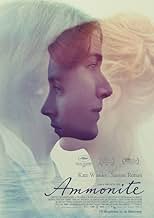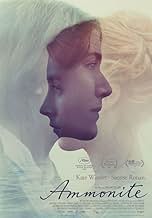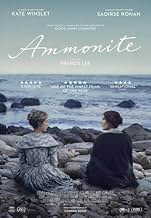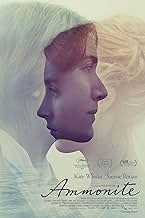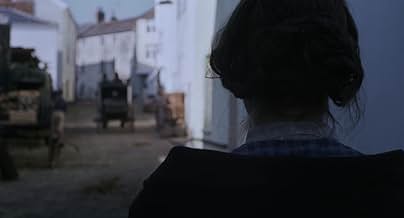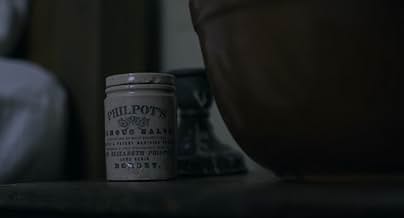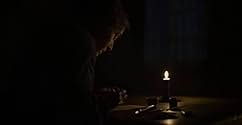Ammonite
- 2020
- Tous publics
- 1h 57min
NOTE IMDb
6,5/10
25 k
MA NOTE
Angleterre, 1840. Mary Anning, paléontologue peu reconnue par ses pairs, exhume des fossiles des plages de Lyme. Un jour, un confrère lui confie la garde de sa femme convalescente. Au fil du... Tout lireAngleterre, 1840. Mary Anning, paléontologue peu reconnue par ses pairs, exhume des fossiles des plages de Lyme. Un jour, un confrère lui confie la garde de sa femme convalescente. Au fil du temps, une relation forte se noue entre elles.Angleterre, 1840. Mary Anning, paléontologue peu reconnue par ses pairs, exhume des fossiles des plages de Lyme. Un jour, un confrère lui confie la garde de sa femme convalescente. Au fil du temps, une relation forte se noue entre elles.
- Réalisation
- Scénario
- Casting principal
- Nomination aux 1 BAFTA Award
- 3 victoires et 33 nominations au total
Victoria Elliott
- Three Cups' Maid
- (as Victoria Elliot)
Robert Purdy
- Party Guest
- (as Robert J. Purdy)
Avis à la une
The first word that comes to mind when reviewing Ammonite is implicit. The only other review (at the time of writing) laments the lack of explicit sex scenes. There's no need for them; this is an understated love story, not a porn film. The sex scenes are few in number, but shot with delicacy and restraint. In fact, very little of this movie is explicit. An awful lot is left to the imagination of the viewer. Back stories are hinted at, touched briefly upon and only once filled in. Even the ending is left to us to imagine. Implicit, rather than explicit, is the watchword for this movie. The performances of the four female leads are in the same vein. Subtly acted throughout; never overdone. A really beautiful movie.
I just wanna point out that the scenes with no dialogue are the one's that say a lot ... Kate Winslet masters the way she talks only with her eyes.
I put this film in the genre of Lesbian Twaddle - I can say that as I am one. I'm not sure who these films are aimed at, but that is beside the point. My main problem with this film is the misogyny and it is a big problem. Very rarely does a film make me cross, but this one did. It also makes me cross that I have only found one review that picks up on this issue. It's on a website called Paste if anyone wants to look it up. Many people question, why make up a lesbian romance for Mary Anning when there is no evidence for one, but no-one questions the misogynistic approach. I personally don't have a problem with the lesbian bit -we have been written out of history.
The initial premise of the film and main focus of the first half hour or so, it to highlight the misogyny of the scientific establishment at the time and Mr Murchison's treatment of his wife. The ultimate irony is that, Francis Lee by his portrayal of Charlotte Murchison and Elizabeth Philpot (Fiona Shaw), does both these women a great dis-service. Charlotte is portrayed as vapid and Elizabeth as some old hippy type making herbal remedies, when they were both accomplished scientists in their own right and had interesting lives. The film is misogynistic because it gives less attribution to their paleontology achievements than did the male-dominated natural history circles at the time!
Unless Francis Lee simply wants to maintain his position as prime director of LGBT films (I thought God's Own Country was excellent), I don't know why he felt the need, when Mary Anning had a very eventful life which would have made a much better film, to create a mythical lesbian romance. He would have done just as well to base a film on her brother Joseph. Rich man from London turns up in Lyme Regis with his errant son, leaves him with Joseph because he thinks a bit of sea air and hard work in the upholstery trade will turn his life around. A bit of drudgery with horsehair and cotton wadding, then sex on a pebbly beach - job done!
I gave the film six stars because it was well acted and the cinematography and costumes were excellent. However two last points that I think were huge gaffs. No-one in 1840 and who kept their own chickens would cook an addled egg or one with a chick in (it happened so fast I couldn't quite see) as eggs would be collected every day and you know if a hen has gone broody is sitting on eggs. Gone off eggs float when put in a bowl of water. Also I'm sure men did not tie their scarves in a Hoxton knot in 19th Century England - maybe on the continent but not here!
The initial premise of the film and main focus of the first half hour or so, it to highlight the misogyny of the scientific establishment at the time and Mr Murchison's treatment of his wife. The ultimate irony is that, Francis Lee by his portrayal of Charlotte Murchison and Elizabeth Philpot (Fiona Shaw), does both these women a great dis-service. Charlotte is portrayed as vapid and Elizabeth as some old hippy type making herbal remedies, when they were both accomplished scientists in their own right and had interesting lives. The film is misogynistic because it gives less attribution to their paleontology achievements than did the male-dominated natural history circles at the time!
Unless Francis Lee simply wants to maintain his position as prime director of LGBT films (I thought God's Own Country was excellent), I don't know why he felt the need, when Mary Anning had a very eventful life which would have made a much better film, to create a mythical lesbian romance. He would have done just as well to base a film on her brother Joseph. Rich man from London turns up in Lyme Regis with his errant son, leaves him with Joseph because he thinks a bit of sea air and hard work in the upholstery trade will turn his life around. A bit of drudgery with horsehair and cotton wadding, then sex on a pebbly beach - job done!
I gave the film six stars because it was well acted and the cinematography and costumes were excellent. However two last points that I think were huge gaffs. No-one in 1840 and who kept their own chickens would cook an addled egg or one with a chick in (it happened so fast I couldn't quite see) as eggs would be collected every day and you know if a hen has gone broody is sitting on eggs. Gone off eggs float when put in a bowl of water. Also I'm sure men did not tie their scarves in a Hoxton knot in 19th Century England - maybe on the continent but not here!
Ferociously slow and meandering, lacking the passion and emotion of its contemporaries and a little too long for what it bestows, which is a rather bleak and salty tale of two lost and lonely women, one of which has had her flint removed and couldn't catch light if you dosed her in kerosene and dropped her into the sun. There's always, at least, a little optimism and expectation, hope perhaps, even in the most forlorn of our turbulent times, but seemingly not here.
I rather enjoyed this movie. It is about a subject and person foreign to me, a self-made female paleontologist in the 19th century England. Because she was female she had no real chance for recognition until long after her death.
Kate Winslet is one of my favorites over the years, here she is Mary Anning with a love of the seashore and fossils and little time for people and small talk. She gets a visit from a fellow paleontologist who leaves his young wife there to get healthy, to me she seemed unhappy from depression, not an organic sickness. This role is played well by another of my favorites, Saoirse Ronan as Charlotte Murchison. At first both are reluctant but they eventually form a bond.
It was speculated that Anning was a lesbian and although not substantiated that is the arc of her character here. All in all a very well made movie combining historical facts and fictional projections. Filmed in the SW England coastal region where Anning lived and discovered her fossils.
At home on DVD from my public library. My wife skipped, she was on a golfing trip.
Kate Winslet is one of my favorites over the years, here she is Mary Anning with a love of the seashore and fossils and little time for people and small talk. She gets a visit from a fellow paleontologist who leaves his young wife there to get healthy, to me she seemed unhappy from depression, not an organic sickness. This role is played well by another of my favorites, Saoirse Ronan as Charlotte Murchison. At first both are reluctant but they eventually form a bond.
It was speculated that Anning was a lesbian and although not substantiated that is the arc of her character here. All in all a very well made movie combining historical facts and fictional projections. Filmed in the SW England coastal region where Anning lived and discovered her fossils.
At home on DVD from my public library. My wife skipped, she was on a golfing trip.
Le saviez-vous
- AnecdotesSaoirse Ronan's favourite film growing up was Titanic (1997), so she was overjoyed to not only act in a film with Kate Winslet, but to also play her lover. Ronan said to Winslet when filming: "Who would have thought, when I was eight years old, that I'd be kissing Rose one day!"
- GaffesCharlotte is portrayed as younger than Mary, with Kate Winslet being almost twenty years older than Saoirse Ronan. In reality, Charlotte was a decade older than Mary.
- ConnexionsFeatured in Projector @ LFF: Ammonite (2020)
- Bandes originalesGesellschafts - Walzer, Op. 5
Composed by Johann Strauss Sr. (as Johann Strauss Snr.)
Arranged by John Mortimer
Performed by David Juritz, Ben Hancox and James Boyd
Meilleurs choix
Connectez-vous pour évaluer et suivre la liste de favoris afin de recevoir des recommandations personnalisées
Détails
Box-office
- Budget
- 10 000 000 £GB (estimé)
- Montant brut aux États-Unis et au Canada
- 160 930 $US
- Week-end de sortie aux États-Unis et au Canada
- 87 552 $US
- 15 nov. 2020
- Montant brut mondial
- 1 109 287 $US
- Durée1 heure 57 minutes
- Couleur
- Rapport de forme
- 1.85 : 1
Contribuer à cette page
Suggérer une modification ou ajouter du contenu manquant








